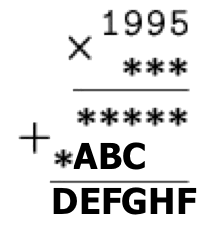Problems
There are \(n\) integers. Prove that among them either there are several numbers whose sum is divisible by \(n\) or there is one number divisible by \(n\) itself.
Prove that \(n^2 + 1\) is not divisible by \(3\) for any natural \(n\).
Solve the equation with natural numbers \(1 + m + m^2 + m^3 = 2^n\).
Michael thinks of a number no less than \(1\) and no greater than \(1000\). Victoria is only allowed to ask questions to which Michael can answer “yes” or “no” (Michael always tells the truth). Can Victoria figure out which number Michael thought of by asking \(10\) questions?
The parliament of a certain country has two houses with an equal number of members. In order to make a decision on an important issue all the members voted and there were no abstentions. When the chairman announced that the decision had been taken with a 23-vote advantage, the opposition leader declared that the results had been rigged. How did he know it?
In the rebus below, replace the letters with numbers such that the same numbers are represented with the same letter. The asterisks can be replaced with any numbers such that the equations hold.

An explanation of the notation used: the unknown numbers in the third and fourth rows are the results of multiplying 1995 by each digit of the number in the second row, respectively. These third and fourth rows are added together to get the total result of the multiplication \(1995 \times ***\), which is the number in the fifth row. This is an example of a “long multiplication table”.
Is it possible to find natural numbers \(x\), \(y\) and \(z\) which satisfy the equation \(28x+30y+31z=365\)?
Four numbers (from 1 to 9) have been used to create two numbers with four-digits each. These two numbers are the maximum and minimum numbers, respectively, possible. The sum of these two numbers is equal to 11990. What could the two numbers be?
Prove there are no integer solutions for the equation \(x^2=y^2+1990\).
Given a board (divided into squares) of the size: a) \(10\times 12\), b) \(9\times 10\), c) \(9\times 11\), consider the game with two players where: in one turn a player is allowed to cross out any row or any column if there is at least one square not crossed out. The loser is the one who cannot make a move. Is there a winning strategy for one of the players?